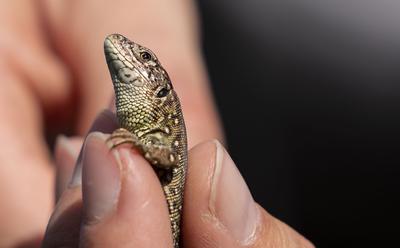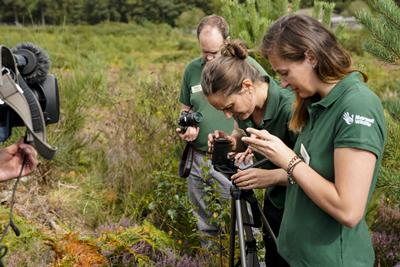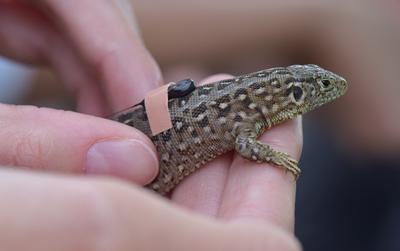
A student from the University of Southampton, working as part of a conservation team from Marwell Wildlife, has released 80 rare, juvenile sand lizards into an area of heathland near Farnborough in Hampshire - the last group of 240 of the reptiles to be reintroduced to the area.
The lizards, one of the rarest in the UK, are now making their home on Eelmoor Marsh Site of Special Scientific Interest as part of the last phase of a release plan and research project led by Southampton PhD student Rachel Gardner.
Once common across heathlands of southern England, sand lizard numbers have decreased dramatically due to habitat loss and fragmentation. They are now only found in a handful of heathland and dune sites in southern England, Wales and Merseyside.

The focus of this intensive three-year project is to monitor the animals, including evaluating the behaviour, habitat use and survivorship of individuals (hatchlings and yearlings), which are uniquely identifiable by their individual spot pattern. The study has been able to directly observe differences in activity across age groups, as well as gain insights into their establishment on site.
In 2018, as a first for the species following reintroduction, tiny radio tags weighing less than 0.3 grams were used to assess the animals' activity within a complex microhabitat and build a clearer picture to help conserve this cryptic species.
Rachel, a postgraduate researcher in Conservation Biology, says; "We have seen some unexpected behaviours, for example, some individuals travelled over a hundred metres away from the release site within just a couple of weeks. Considering the size of the animals [a few centimetres long] and the complexity of the heathland environment, this is quite a distance in such a short space of time."

Rachel continues: "It's been a privilege to work on this project and observe the sand lizards in such detail. Not only is Marwell Wildlife contributing to the wider reintroduction programme by breeding them in captivity for release into their natural environment, but we hope the research will help inform and make recommendations for the reintroduction protocol in the future, and therefore help optimise its conservation success."
Eelmoor Marsh, owned by QinetiQ and managed by Marwell Wildlife, has been restored to 'favourable' condition following more than 20 years of targeted habitat management. An area closed to the public, it has allowed Rachel to monitor the finer details of the sand lizards' ecology with no unnatural disturbances.
Alongside key partners, including the Amphibian and Reptile Conservation Trust and with support from Natural England, Marwell Wildlife, based near Winchester, has contributed over 2,000 sand lizards for release in Southern England and hopes to continue conserving this specialist heathland species.






